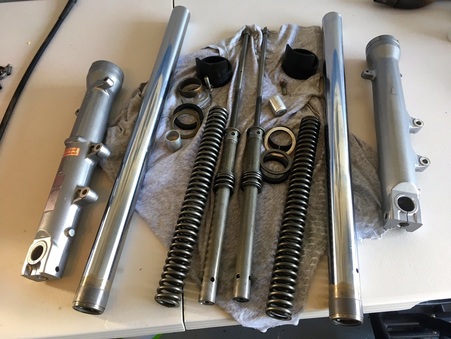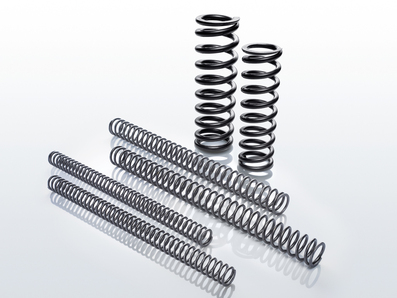

••••••
For much more on suspension theory and real-life application I strongly recommend Lee Parks' book Total Control.
|
 Project 22, a '97 VFR750, is in the final phase of its mechanical checks. The last item before final reassembly is the leaking fork seals. Upon removal and disassembly the fork internals look great, the only modification being stiffer springs — in this case a set of straight-wound 1.1kg/mm from DMr back in 2009. I reassembled with 5w fork oil as recommended by Honda. So what does spring rate mean? In simple terms, my 1.1kg/mm spring means that it will require 1.1 kilograms (2.4 pounds) of force to move the spring one millimeter. Straight-wound means that the spring has a constant resistance throughout its movement — each additional millimeter of movement requires an additional 1.1kg of force. A true progressive or dual-rate spring will have less resistance in its initial travel and greater resistance as it compresses. This would theoretically be ideal in a street application, so as to allow small bumps to move the fork (or swingarm) more easily (less jarring) but then resist large bumps to prevent bottoming. In practice, however, this isn't completely practical for the relatively short fork/shock travel common to street motorcycles, but is very useful in the off-road world with their long-travel suspensions. Soft initial travel also promotes undesirable fork dive under braking. In fact, road race bikes will almost always have straight-wound (constant rate) springs. This allows the rider to experience the same springing throughout his ride — no surprises. Of course, race bikes typically ride on relatively smooth surfaces.  The reality is that springs are mostly there to hold the bike up at a correct height — it's the damping system's job to provide suspension control, and so is much more important to handling. A high-end shock absorber like an Ohlins, for example, has a similar spring to anyone else, it's whats inside that counts. •••••• For much more on suspension theory and real-life application I strongly recommend Lee Parks' book Total Control.
0 Comments
Your comment will be posted after it is approved.
Leave a Reply. |
THE SHOP BLOG
|